#Work in a Person-Centred Way Course UK
Explore tagged Tumblr posts
Text
Explore the Best Health Care Courses: Your Pathway to a Rewarding Career

In today’s ever-evolving medical landscape, the demand for skilled healthcare professionals continues to rise. With advancements in medical technology, an ageing population, and an increased focus on public health, the need for well-trained individuals has never been greater. For those looking to embark on a meaningful and secure career, enrolling in Healthcare Courses in the UK offers a gateway to a fulfilling future.
Why Choose a Career in Health Care?
A career in health care is more than just a job—it is a commitment to improving lives. Whether you’re treating patients directly or working behind the scenes in medical administration, your contribution significantly impacts communities and individuals. Health care roles are diverse, ranging from nursing, physiotherapy, and radiography to health management and mental health support.
In the UK, the health care sector is one of the largest employers, and with the growing demand, it continues to offer stable employment opportunities. Professionals trained through accredited Health Care Courses in the UK are highly regarded both domestically and internationally, making it a strategic choice for students and career changers alike.
Overview of Health Care Courses in the UK
Health care education in the UK is well-structured and internationally respected. It includes a wide array of academic and vocational programs designed to meet the needs of both entry-level students and seasoned professionals seeking specialisation.
Here are some of the popular healthcare courses in the UK:
1. Nursing and Midwifery
These courses prepare students to work as registered nurses or midwives. They combine academic theory with practical experience, often including clinical placements. With several pathways available—adult nursing, children’s nursing, mental health nursing, and learning disability nursing—students can choose a specialisation that suits their interests.
2. Allied Health Professions
This category includes physiotherapy, occupational therapy, radiography, speech and language therapy, and more. These courses are designed to equip students with clinical skills and knowledge to support patients in various ways, from rehabilitation to diagnosis.
3. Health and Social Care
Ideal for those interested in working within community settings, care homes, or social services, these courses blend health education with social care practices. They are particularly suited for careers that involve working with vulnerable populations, including the elderly and individuals with disabilities.
4. Public Health and Health Promotion
These programs focus on preventing illness and promoting health through policy, education, and community initiatives. Students learn about epidemiology, health statistics, and effective strategies to combat health inequalities.
5. Medical and Clinical Sciences
For those aspiring to become doctors, laboratory technicians, or biomedical scientists, medical sciences courses provide in-depth knowledge of human biology, disease mechanisms, and research methodologies.
Entry Requirements and Duration
Entry into healthcare courses in the UK typically depends on the level and type of program. Undergraduate courses generally require A-levels or equivalent qualifications, while postgraduate courses may require a bachelor's degree in a relevant subject. Vocational and diploma courses may have more flexible entry requirements, making them accessible to a broader audience.
Course durations can vary:
Diplomas and certificates: 6 months to 2 years
Undergraduate degrees: 3 to 4 years
Postgraduate degrees: 1 to 2 years
International students must also meet English language requirements through standardised tests such as IELTS or TOEFL.
Benefits of Studying Health Care in the UK
1. World-Class Education
UK institutions are renowned for their academic excellence. Courses are regulated and updated regularly to align with modern practices and ethical standards. Students benefit from experienced faculty, advanced facilities, and practical training.
2. Hands-On Experience
Many Health Care Courses in the UK incorporate clinical placements, giving students first-hand experience in hospitals, care homes, or community settings. This prepares them to transition smoothly into employment upon graduation.
3. Global Recognition
Qualifications obtained from UK institutions are respected worldwide. This makes it easier for graduates to find employment opportunities abroad or pursue further studies in other countries.
4. Career Support and Progression
Most health care programs offer career guidance, internships, and networking opportunities. Additionally, graduates can progress into advanced roles or pursue specialisations through continuous professional development (CPD).
5. Diverse Learning Environment
The UK is home to a multicultural student body, providing a rich cultural exchange. International students are welcomed and supported through tailored services, orientation programs, and academic assistance.
Career Prospects After Completion
Graduates of Health Care Courses in the UK can pursue a wide range of careers in both the public and private sectors. Some popular roles include:
Registered Nurse
Physiotherapist
Healthcare Assistant
Radiographer
Occupational Therapist
Public Health Officer
Medical Laboratory Technician
Mental Health Support Worker
With experience and further study, many professionals advance into leadership, research, or teaching positions, further enhancing their impact in the field.
Final Thoughts
Choosing a career in health care is a decision that not only benefits the individual but also society at large. With the UK’s robust education system and its reputation for producing skilled and compassionate health professionals, enrolling in healthcare courses in the UK is a step toward a rewarding, respected, and resilient career.
Whether you’re just starting, switching careers, or seeking advancement, health care offers a diverse and meaningful pathway. By investing in the right education and training, you open the door to a world of opportunity—one where your skills can truly make a difference.
#Health Care Courses in UK#Health and Social Care Courses UK#Construction Training Programs UK#Health Care Certificate Program UK#Awareness of Mental Health Disabilities UK#Dementia and Learning Disabilities UK#Basic Life Support UK#NHS and social care sector in the UK#Communication Course UK#Communication Awareness for Healthcare Professionals UK#Duty of Care Course UK#Healthcare and Adult Social Care Course UK#Equality and Diversity course UK#Fluids and Nutrition Course UK#Handling Information Course UK#Health and Safety Course UK#Infection Prevention and Control UK#Privacy and Dignity Course UK#Safeguarding Adults Course UK#Safeguarding Children Course UK#Understand Your Role Course UK#Work in a Person-Centred Way Course UK#Your Personal Development Course UK#Care Skills and Competencies Program UK#Advance Care Planning Courses UK#Bladder Care and Management Course UK#Bowel Care and Management Course UK#Care after Death Course UK#Care Planning Training Course UK#Diet and Nutrition Course UK
0 notes
Text
Top Health and Social Care Courses to Elevate Your Skills and Career Opportunities
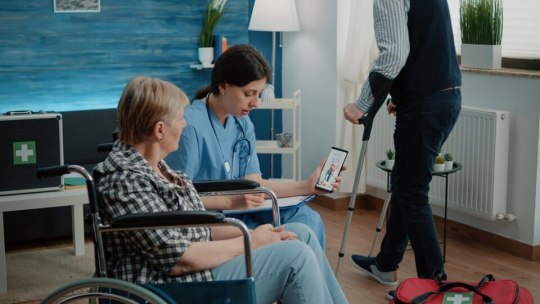
In an era where the demand for compassionate, skilled professionals continues to rise, the health and social care sector offers rewarding opportunities for those eager to make a difference. Whether you're just starting or looking to advance your existing career, enrolling in Health and Social Care Courses UK can provide the necessary knowledge, skills, and qualifications to thrive in this essential field.
Why Choose a Career in Health and Social Care?
The health and social care sector is one of society's most critical components, encompassing services that support physical, mental, and emotional well-being. From hospitals and clinics to care homes and community support centres, professionals in this field touch lives every day.
A career in health and social care is both fulfilling and stable. With an ageing population and growing awareness of mental health needs, the UK sees consistent demand for qualified individuals who can support various populations, including the elderly, children, individuals with disabilities, and those facing mental health challenges.
The Importance of Proper Training
Undertaking Health and Social Care Courses UK is essential for legal and regulatory compliance and for delivering the highest standard of care. These courses equip learners with practical skills, theoretical knowledge, and a deep understanding of professional ethics and person-centred care.
Through structured learning, individuals can develop competencies in safeguarding, communication, health and safety, equality and diversity, and more. This ensures a consistent level of quality and safety across care services, ultimately benefiting service users and improving community well-being.
Categories of Health and Social Care Programs in the UK
There are various Health and Social Care Courses UK designed to cater to all levels — from entry-level certificates to advanced diplomas and degrees. Here are some popular course types available across the country:
1. Level 2 and Level 3 Diplomas in Health and Social Care
These qualifications are ideal for those starting their journey. Level 2 diplomas introduce core subjects such as safeguarding, communication, and personal development. Level 3 goes a step further, preparing learners for senior care positions with modules covering risk assessment, leadership, and care planning.
2. Foundation and Bachelor’s Degrees
For those aiming for higher-level roles or further specialisation, a university degree offers in-depth knowledge in areas like mental health, adult care, and social work. These programs often include work placements, allowing students to gain hands-on experience.
3. Specialised Courses and Certificates
There are short courses and certifications for professionals who wish to specialise in specific areas, such as:
Dementia care
Autism support
Mental health first aid
Palliative care
Safeguarding children and adults
These targeted programs allow professionals to expand their skillset and deliver more tailored support.
4. Online and Part-Time Options
To accommodate working professionals, many Health and Social Care Courses UK are available online or on a part-time basis. These flexible options allow individuals to study at their own pace while gaining valuable qualifications.
Career Opportunities After Completing Health and Social Care Courses
Completing relevant courses opens the door to a wide range of career paths in both the public and private sectors. Here are just a few of the roles you can pursue:
Care Support Worker
Healthcare Assistant
Social Worker
Mental Health Support Worker
Youth Worker
Residential Care Manager
Community Outreach Coordinator
For those with leadership aspirations, progressing through the ranks to become a team leader, care manager, or policy advisor is also achievable with the right qualifications and experience.
Benefits of Studying Health and Social Care Courses in the UK
Choosing to study Health and Social Care Courses UK brings a multitude of benefits:
1. High Employability
With a continuous demand for skilled professionals, job prospects in this sector remain strong. Employers value candidates who have undergone accredited training and demonstrate a solid foundation in care principles.
2. Work-Life Flexibility
Care roles often offer flexible working hours, making them an appealing choice for individuals seeking a balance between professional and personal life.
3. Career Progression
The structured course levels and availability of continuous professional development (CPD) opportunities allow learners to steadily climb the career ladder.
4. Opportunity to Make a Real Impact
Above all, health and social care professionals contribute significantly to individuals’ lives and the well-being of communities. It’s a field where compassion and expertise meet to create tangible change.
How to Choose the Right Course
When selecting from the wide range of Health and Social Care Courses UK, consider the following factors:
Accreditation: Ensure the course is accredited and meets regulatory standards.
Content and Modules: Look for programs that align with your career interests.
Flexibility: Choose between full-time, part-time, or online depending on your schedule.
Practical Training: Preferably opt for courses that include hands-on placements.
Progression Opportunities: Think long-term — will the course help you reach your ultimate career goal?
Final Thoughts
Health and social care is not just a profession — it’s a vocation that demands empathy, resilience, and a commitment to continuous learning. By enrolling in Health and Social Care Courses UK, you’re not only enhancing your qualifications but also positioning yourself as a trusted and competent professional in a field that truly matters.
Whether you're aiming to enter the industry or expand your current expertise, there's a course out there to support your aspirations. Start your journey today and become part of a workforce that changes lives — one person at a time.
#Health and Social Care Courses UK#Construction Training Programs UK#Health Care Certificate Program UK#Awareness of Mental Health Disabilities UK#Dementia and Learning Disabilities UK#Basic Life Support UK#NHS and social care sector in the UK#Communication Course UK#Communication Awareness for Healthcare Professionals UK#Duty of Care Course UK#Healthcare and Adult Social Care Course UK#Equality and Diversity course UK#Fluids and Nutrition Course UK#Handling Information Course UK#Health and Safety Course UK#Infection Prevention and Control UK#Privacy and Dignity Course UK#Safeguarding Adults Course UK#Safeguarding Children Course UK#Understand Your Role Course UK#Work in a Person-Centred Way Course UK#Your Personal Development Course UK#Care Skills and Competencies Program UK#Advance Care Planning Courses UK#Bladder Care and Management Course UK#Bowel Care and Management Course UK#Care after Death Course UK#Care Planning Training Course UK#Diet and Nutrition Course UK#Duty of Care Awareness Course Uk
0 notes
Text
New WWE AU Idea: Newscaster AU
Ok, I need to put this down somewhere before it drives me insane. It's a stupidly niche AU idea but it's taking up so much brain power for me right now for some reason. It's a journalist AU where the WWE is a TV news channel. Details below the cut.
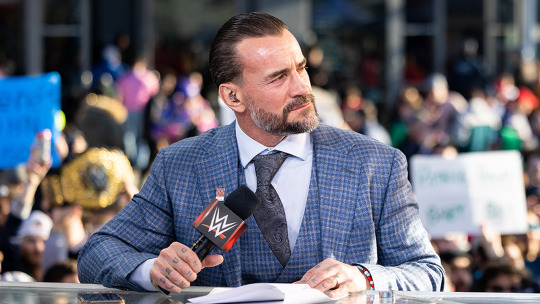
But basically I've been thinking about all the people who've been running the PLE pre & post shows & hosting PLEs this year a lot. And with the whole news-style interviews and sitting around on sets that often look like news studios, what if they were all actual reporters in a news channel? It's a bit of a weird one I know, but it's been rolling around in my head all weekend.
Btw I have no idea if USA news channels call their emplyees the same sort of titles as we have in the UK so excuse me if the job titles are a bit scuffed. But basically here's all the roles they have, why I chose those roles for them (in brackets), and what they get up to as part of this AU news channel:
Michael Cole: Senior Newsreader- (Because of his commentary work and journalism background). Out of all the people currently regularly on TV, he's been there the longest and is highly respected. Always trusted to keep a level head in times where the world feels like it's gone to hell.
Corey Graves: Business Correspondent- (Because he has a degree in marketing). Feel like he'd do a segment kinda like "The Martin Lewis Money Show" we have in the UK, where he goes through government changes to finance-related stuff, explains it and how it'll affect the average person, and then answers questions from a live studio audience and gives them advice.
Wade Barrett: Environmental Correspondent- (Because he has a degree in marine biology). I get the vibe his favourite animals are tiny and obscure things like a specific type of sea pickle on the verge of extinction or something and he defends them aggressively to get people to help save the species. Has memorised his evidence for global warming and can reel it off with ease, but is sick of having to do it so much cos people STILL DON'T BELIEVE IN IT????????
Pat McAfee: Sports Correspondent- (Do I even need to explain why? He's a mad man and I can't imagine him doing anything else, even out of a whole cast of people on a sports show like WWE). Feel like most people try to keep somewhat calm and professional on a news show, but he's just himself the whole way through, making him one of the most popular reporters on the whole channel because people want to see his OTT reactions to certain events. Feel like he'd also probably be in charge of the news station's radio show, too, what with how he has the Pat McAfee Show in real life.
Big E Langston: Political Correspondent- (He just gives me that vibe being all analytical about wrestling feuds). He's just as tired with politicians' nonsense as we all are, to the point it's hard to hide his dissappointment when they say something stupid and he has to remain unbiased. Never lets politicians get away with evasive answers when he interviews them, but smiles the whole time as he makes them wish they were never born.
CM Punk: War Correspondent- (The man is always scrapping for the love of the game, so of course he'd be in the centre of a war). He's had bombs dropped on his head more times than he can count and regularly goes for runs as a workout to make sure he's still fit enough to run for his life when he's in active warzones. Can tell you all about the complex international relations and battle strategies but secretly has a morbid interest in death & gore which is what actually got him into the job. Once got shot on live television, showed off the wound on camera and finished his broadcast before getting medical treatment. Was only mildly miffed about nearly dying, mostly excited by the whole experience.
Jackie Redmond: Justice Correspondent- (Basically her analyst role in WWE gives me the vibe of someone discussing a crime case). Can tell you all about how 17 people have been skinned alive and cannibalised in graphic detail so casually as if she's talking about the weather. At this point in her career, pretty much nothing can phase her. So if something actually manages to leave her speechless, you know it's bad.
Cathy Kelley: General Reporter- (Basically cos it's just what she's doing in WWE). Going wherever she needs to be to interview people and get to the bottom of a story. Has interviewed some really dangerous people that are twice her size all in the name of finding a good story and everyone's just like "for the love of god please think about ur own safety for once."
The Miz: Media Correspondent- (Cos of his reality TV background and generally over the top vibes). He'd be all over red carpet events and he's definitely still hoping to use his media journalism as some leverage to get into show-business himself. Celebs see him at events and pray they haven't been spotted so they don't have to talk to him, cos he can be a lot. But this little bastard has the eyes of a hawk and will hunt them down. Especially if he's persoanlly a big fan of them and their work.
R-Truth: Weatherman- (Cos he's a ray of sunshine :) ) Just imagine the batshit insanity of him telling people about a storm or how nice the weather's gonna be or something (I'm thinking like a Bob Hale skit on the original Horrible Histories, that kind of madness).
Sheamus: Tech Correspondent- (Cos he's a former IT technician so he can be all brainy). Constantly treated like IT support rather than a journalist and is sick of having to switch on servers people promised were already on, and listening to people with no idea what they're talking about prattle on about the benefits of AI. But at least he gets to talk about flying cars and robot dogs all day and muck about with new tech for a living.
Triple H: Editor In Chief- (Basically the top role in journalism to match with his current role in real life). Running things is like trying to herd cats, but hey, he can put on a pretty damn good show. Trying desperately to move on from the scandals of the days when the previous editor-in-chief was in charge of things.
Obviously some of them wouldn't be able to use their ring names in those environments. Plus I'm probably forgetting some people who should be in this AU that have been involved in pre/post shows, hosting, and commentary, but my brain's a bit too frazzled to go thru all the PLEs right now.
But like... come on... look at them and just imagine for a second... do you see the vision???? Or have I finally gone a bit mad??
LIKE JUST LOOK AT THEM!!
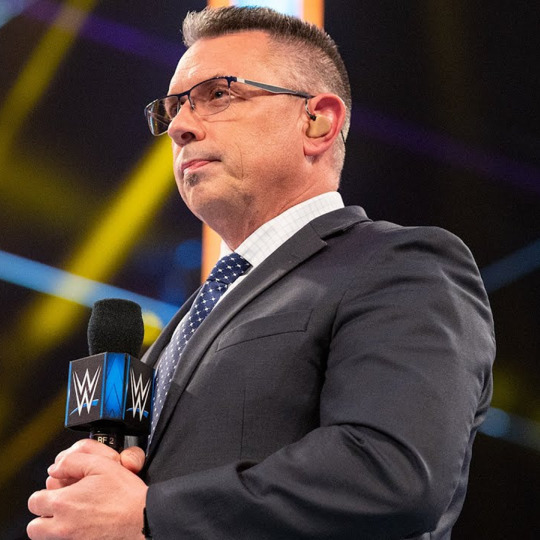

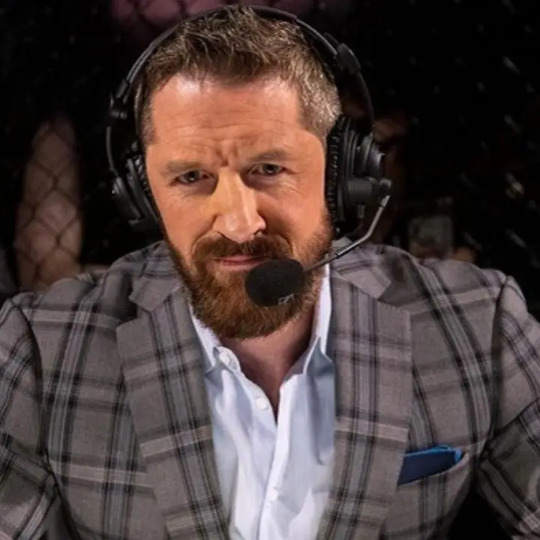

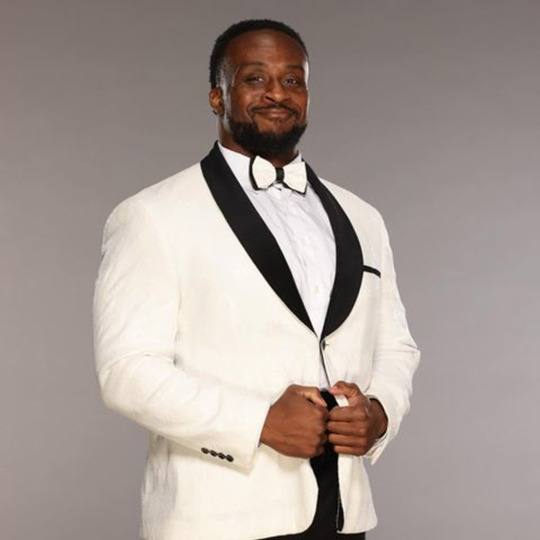

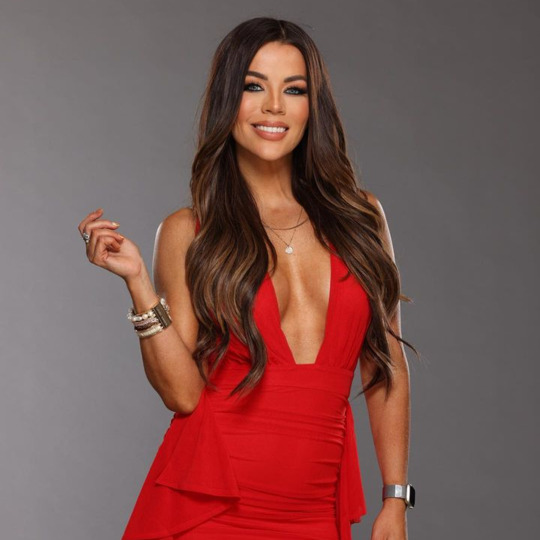
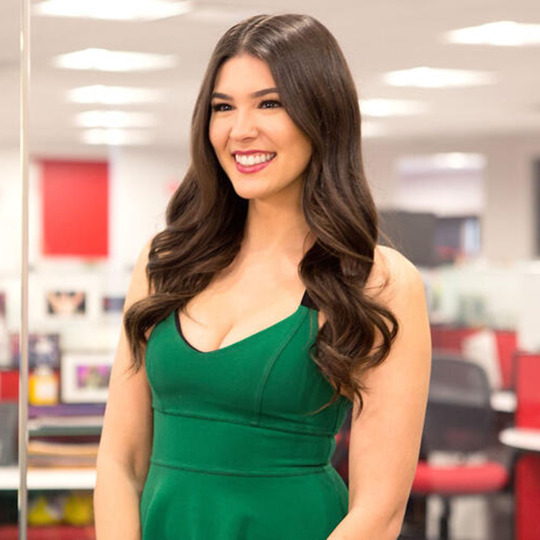

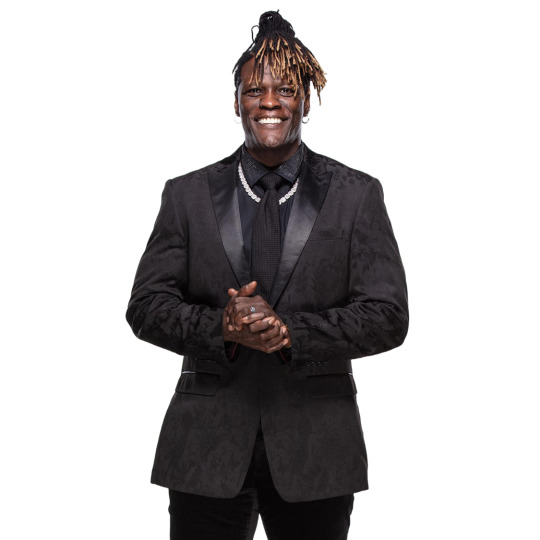
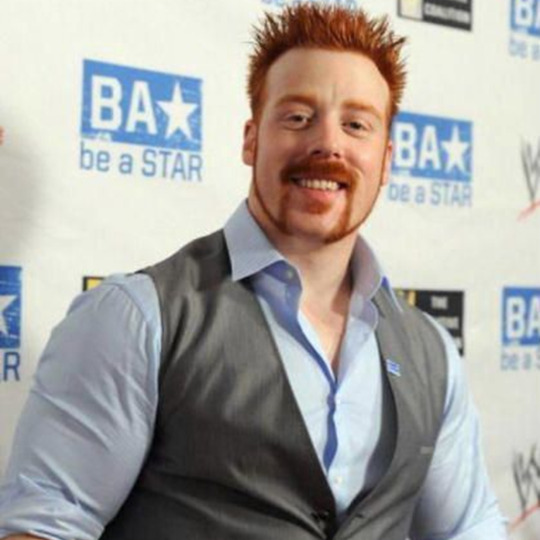

Also it gives me even more reasons to think about punk in suits <3
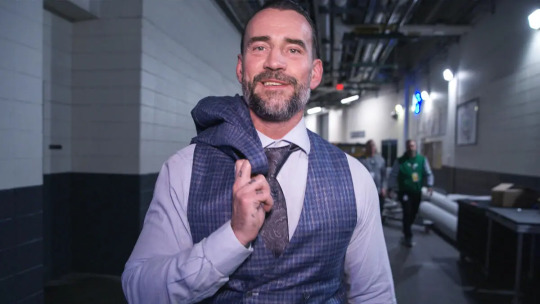
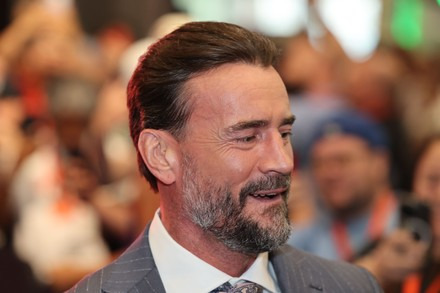
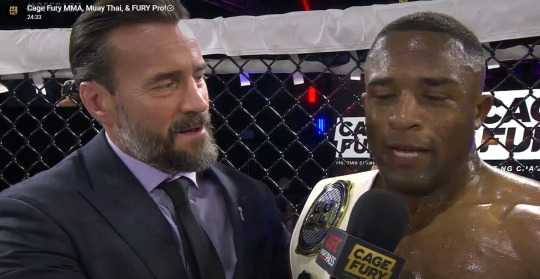
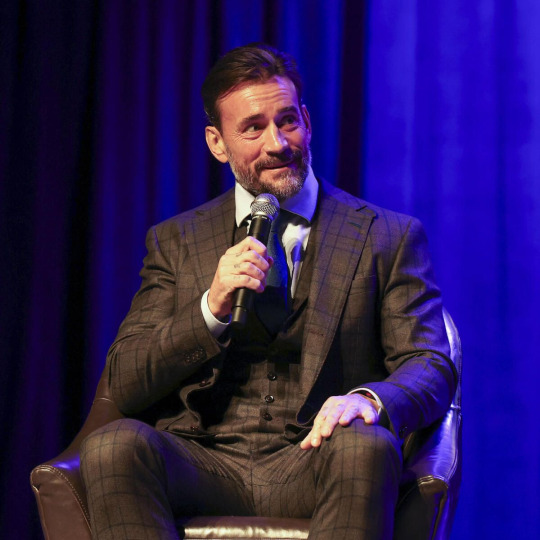

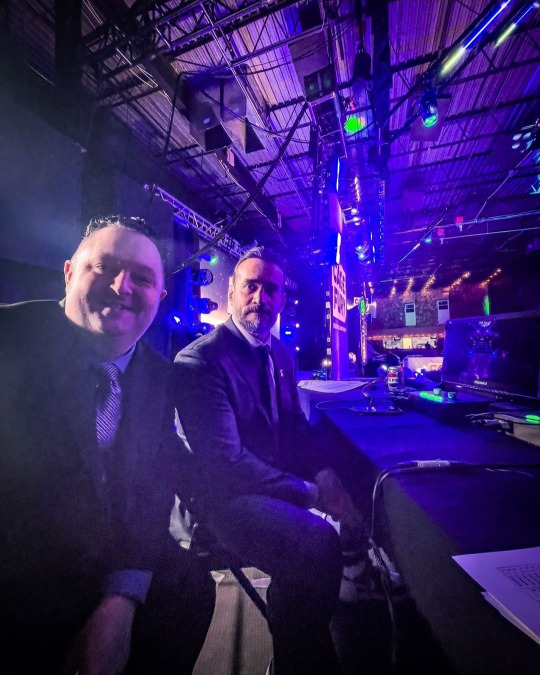
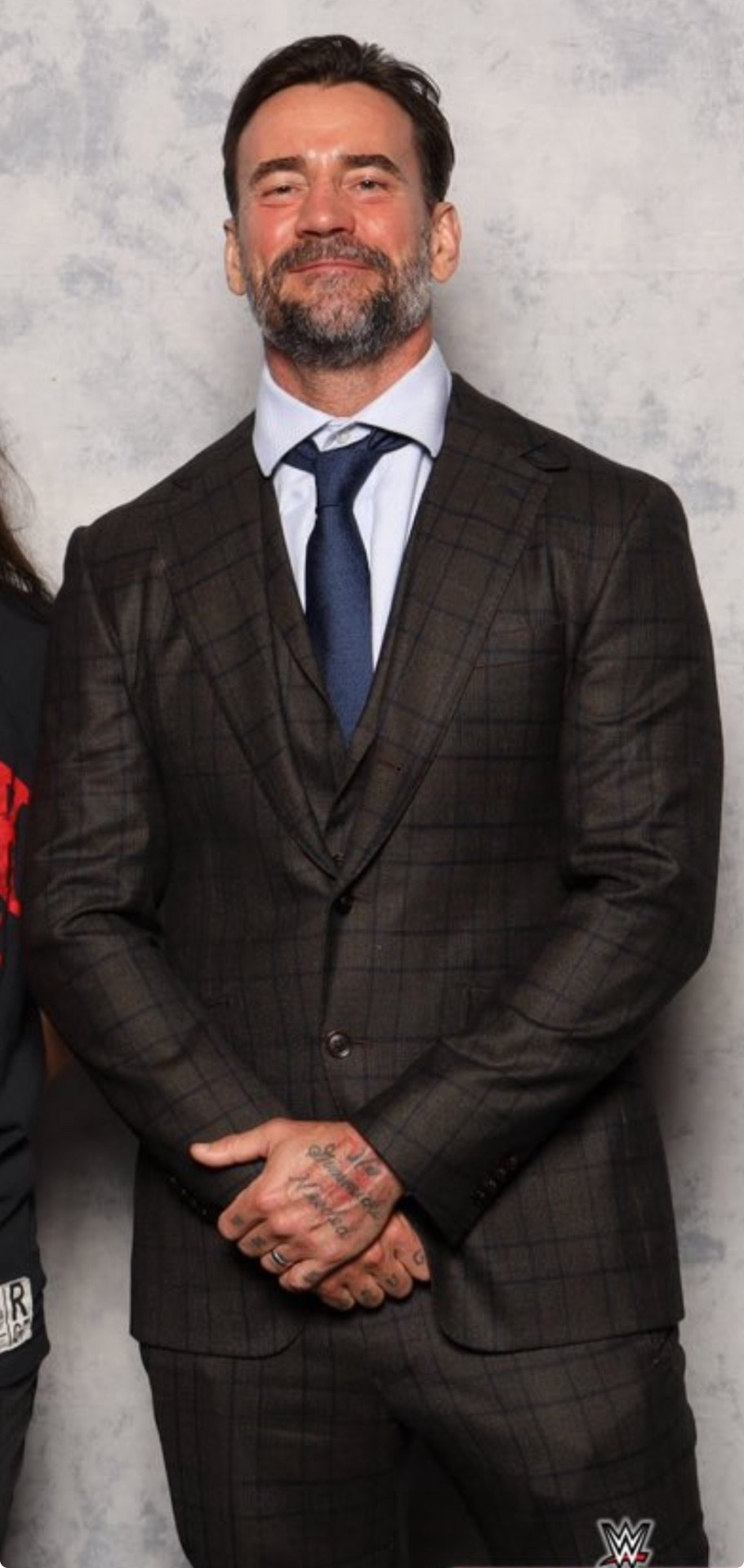


Also also if he were a war correspondent and had to go out into dangerous places, they'd make him wear gear which means more of this. vvv
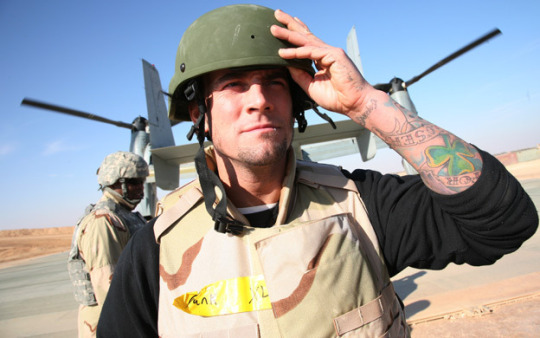
Also CM Punk & Big E Langston are the two people I'm blaming for putting this AU in my head just so you know. Cos look at them!!


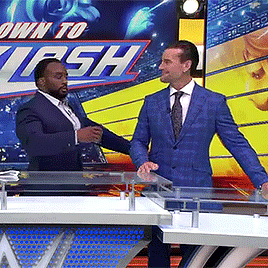
But also since punkintyre died, I've been reliving my sheamus/punk shipping days and just imagine sheamus waiting for his husband to come back from reporting in an active warzone and being worried for his safety (especially if he's been hurt before [whump time?]). And then all the excitement and relief when he gets back and giving each other special attention cos they were both so stressed and now they're just so happy to see each other again.
Also imagine Punk being inept with technology and needing help from tech savvy husband who's so proud that punk's finally learnt how to attach a file in an email. Punk probably sends Sheamus facebook minions memes and Sheamus despairs.
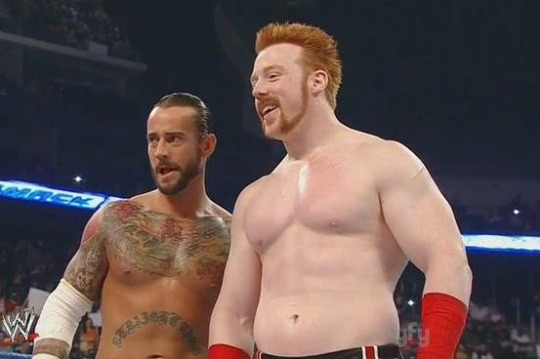
And then Punk excitedley explains all about battle strategies and war history and Sheamus excitedley explains back about the complexities of designing a self driving car or some shit. They're both just being massive nerds together. Even better when their interests overlap, like the design of tanks or something. Feel like they'd be talking for hours and everyone is like "guys come on, we have a show to run" but they're too busy with their hyperfixations (autistic sheapunk anyone? [is that what the ship name is??]).

Just think of the shipping potential!!
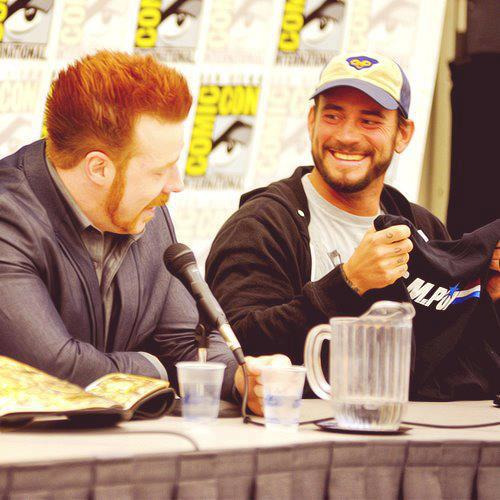
And this whole countdown show also was major inspo cos to me it just looks so much like a news show.
And these three just give me the vibe that E (being a political correspondent) would obviously be doing a show for the elections. And since law and war are both very close to politics, he'd get punk and jackie in to keep him company and the three would do an overnight show reporting on election results as they come in, chatting shit the entire time.
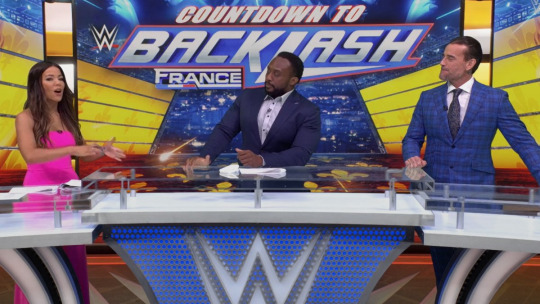
Btw I still don't know what this all means for the other WWE wrestlers. Defeats the point of using commentators and hosts if I also have all the wrestlers also being journalists. So maybe they can be the people featured in the news. All having "normal" jobs like politicians and military and scientists and shit. And these guys can be reporting on their nonsense and bullying them in interviews.
I feel like I could add more people to it, like having ring announcers as general news readers, and Shawn Michaels, Adam Pearce and Nick Aldis as editors or something. And I'm probably forgetting other people who hosted PLEs or were presenters on pre/post shows, and other commentators. So there'll be plenty more that could be added.
Sorry about the info dump but I needed to put this somewhere. I'm not the only one seeing the vision on this am I????
#i know this is such a weirdly specific au to do#but I haven't been able to get it out of my mind all weekend#also journalist sheapunk is giving me feelings right now#i need to dig a very deep hole and just get in it and die rn#the fluff is just getting too fluffy for my cold dead heart to handle#so sweet I'm gonna get diabetes#michael cole#corey graves#wade barrett#pat mcafee#big e langston#cm punk#jackie redmond#cathy kelly#the miz#r-truth#sheamus#triple h#sheapunk#newscaster au#just in case i end up needing a whole tag for it to be able to find my shit again later
21 notes
·
View notes
Text
Poetry for ALL
Some personal anecdotes and a plea follow...
As quite a few of you know, I’ve been engaged in disability awareness and rights campaigning and other work since sometime in the 90s, so when I was given an opportunity to support and host an event dedicated to making performance poetry as accessible as possible in 2018, I jumped on it.
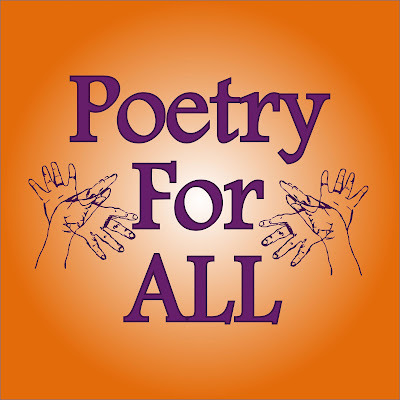
(image description in alt text)
Poetry for All is the brainchild (and heartchild, and soulchild) of Rose Drew, who I first met through one of Richard Tyrone Jones’s Utter events in London. She’s an extraordinary writer and performer, and a powerhouse of an events host and organiser. Within about 30 seconds of watching her on stage, I knew I wanted to be like her when I grew up as an artist. When she got in touch three years later to ask if I’d like to help out with what turned out to be the inaugural event, I threw myself into providing as much support as possible with enthusiastic abandon, and we pulled together a line-up which included the extraordinary performers Raymond Antrobus and DL Williams (“DeafFirefly”), both of whom I’d performed with before and was keen to see again.
Now, there’s a whole section on our new website about the history of the events where you can read the facts, but I want to say here that, personally, that first event in March 2018 (coincidentally on my birthday!) was an absolute eye-opener – seeing how poetry events could expand and develop the ideal of accessibility in ways I hadn’t considered. It was also extremely inspirational as I realised that, well, I was allowed to write about my disabilities. Seeing and hearing artist after artist sharing so much and so eloquently unlocked something in me that I didn’t even know I’d been repressing:
I’m allowed to be an openly disabled poet. I’m allowed to express my neurodivergence. I can tell my truth. 😱🤯
Bit of a culture-shock, but I owe so much to the poets and to Rose (and to Dave Wycherley, BSL interpreter extraordinaire – that’s a hard and physically/ mentally taxing job as it is, but to do that with poetry? on the fly?! breathtaking...) for helping me get to that starting point, knocking down the walls of my own internalised ableism.
So, apart from a paean to self-expression and why representation and finding tribe matters, and a screed of gratitude for new friends made and old friendships strengthened through the course of these events, why am I writing this? What’s with the hashtag? “Plea...?”
Well, so far, since you ask, all of our events have had local funding in York, where they’ve taken place exclusively so far. Rose applied for Arts Council England funding for this and next year for a tour comprising several venues and a host more disabled artists and BSL interpreters from various parts of the UK (all getting paid properly!), but we found out last week that we’d not got the money. Any of it. So our forthcoming event on 24th November in the gorgeous National Centre for Early Music is in jeopardy and, since the thought of Rose (herself a disabled artist on low wages) having to pay for this out of her own pocket was not to be supported, I threw myself at a plan of creating a (somewhat last-minute) Crowdfunder, so that we can at least pay for the venue, the artists’ and interpreters’ fees, the travel and accommodation expenses of those of us coming from out of town, and the costs of producing merchandise to sell. We’ll be producing an anthology in print and ebook form, as a joint publication between indie publishers Stairwell Books and Allographic Press. And, if we exceed our funding goal, there’ll be video and audio available of the event to boot!
We’ve created a frankly very exciting range of pledge rewards for people wanting to support us (all the way from £1 and £2 options, since money is tight, especially for disabled folk, right now, to more chunky ones like private mentoring, workshops, and a publishing package), and we’ve got three weeks(!) to raise our £1,500 to cover the shortfall from ticket and merch sales. Eeep! So, if you’re able to and would like to help us, we’d be ever so grateful. The campaign is here:
https://www.crowdfunder.co.uk/p/poetry-for-all-2023-fundraiser
And if you have absolutely no funds to share with us at all, we’d be incredibly grateful if you shared on social media, with friends, on blogs, all of that!
Thanks for reading all this, and have a great day!
#fay speaks#image#image description#disability#disability awareness#accessibility#fundraiser#crowdfunder#poetry for all#I am going to be posting about this a LOT!#accessible events#accessibility matters#respresentation matters#fundraising
98 notes
·
View notes
Note
Kind of going off your post about how brown and black characters in HOTD and GOT are completely wasted or demolished or turned into a crude caricature.
Ummmm the HATE that is thrown towards Elia Martell is absolutely absurd. The way they hate the idea of this character and are honestly happy with how her character was destroyed is so telling and disgusting.
The hatred and discontent is so real and frightening and we saw a glimpse of that with those leaked texts from some random discord. I guess what I’m just trying to say is racism is far from dead and it’s seen in this fandom.
And yes the entirety of Arianne Martell’s character being a seductress is insane.
Also wanted to mention that the only other time I’ve seen brown characters in the show are as brothel workers. Of course nothing wrong with that sort of work. But it’s the sexualization that’s creepy.
Yeah. Yep. It's just depressing. Sometimes I find myself accepting it because it's so normal at this point, but then I'm like...no???? I hesitated making Amara Dornish and visibly non-white because my own self doubt made me want to . I thought eh I'll just make her from the Riverlands or something, it's less complicated. But then I make her, and people love her and it's not an issue (it's just stuff I've internalised over the years thanks to how society is set up). Which obviously goes to show the people who create our media are deliberately fucking up representation so that we just stop asking. They can create compelling characters that are centred they just don't want to a lot of the time.
That being said, British TV that specifically isn't popular outside of the UK, represents non-white characters quite well and doesn't turn them into caricatures of their culture/ethnicity (at least most of the time). In this case I am talking about American productions and non-British audiences.
On the note of Elia Martell...a lot of the times she is fancasted as Indian. Stereotypes about Dorne are also stereotypes used against Indians ('she smells Dornish' - no two guesses on what Aerys meant). I've seen Indians be used as punching bags for racism by every other race as if it's a free-for-all, to the point where very horrible and very real issues like misogyny in India are treated frivolously and with 'oh well they're all just like that.'
The mistreatment and racism against Elia has real life parallels because of the otherness of Dorne, and since Dorne brings to mind South and Western Asia so much (the way they hid in caves when the dragons came is very reminiscent of Afghan guerilla tactics and their tough terrain that invaders can't adjust to) that's usually the area of the world I associate it with.
It's all very other other other and now pair that up with snow-white daddy Rhaegar and his lily-white, dark-haired Stark girl (because mind you, I understand white blondes have had issues with how they're represented as slutty caricatures onscreen and brunettes as more clever and by extension more desirable in the long-term).
Elia didn't stand a chance against two white people pairing up, and that is honestly the only time when I'm like "you know what, stop fan casting her as desi." The woman is raped in front of her children and watches those same kids die in front of her, and even that isn't enough to stop the cruel jokes.
And yes, absolutely, there's nothing wrong with being a brothel worker. I adore stories about people in the grassroots, brothel workers especially, just trying to survive and get by in the world. But watch the brown workers be immediately depicted as more "comfortable" with this lifestyle, and just naturally promiscuous as compared to their white counterparts.
Meanwhile irl, if the brown person in question is a Muslim for example, their values in terms of modesty are mocked and derided and deemed an extremist 'other'. And then I guess you can be a Mormon in Utah and be just fine.
I honestly don't know if any of this made sense, or if I articulated without room for misunderstanding. Trust me, I do think about this a lot. I'm Kashmiri, and I've lived in England all my life, and my dating pool has mostly been white because that is what's more available. I've dealt with fetishisation/sexualisation (never for the ethnicity I am which most people couldn't even guess...uhhh hilarious) and it's forefront on my mind despite my active decision to leave it out of my fics as much as I can.
It can be very cathartic to talk about, but sometimes I'm like, you know what Amara, I'll take this extra little bit of suffering away from you bc girl you're already dealing with a lot (Aegon)
23 notes
·
View notes
Text
Right-to-buy council houses without specifically only releasing housing that already had a replacement built was of the most notable ways of the *many* that Thatcher et al screwed the UK.
I’d love to have a law put in place that landlords either have to sign contracts to provide housing under council house-type contracts with rent controls to people on housing benefit etc, or sell to the local council at compulsory purchase prices.
Same for all the houses not being lived in - use to house people under contractual controls, or have to sell to the council housing central fund.
Personally I’d start converting all the office units that are no longer needed because so many people are working remotely now into housing too.
Same for the huge city centre shops - I’m not sure if the pattern repeats elsewhere, but I live near Glasgow and the city centre has basically died since Covid. No one is renting the huge retail stores and the place is full of unhoused folk, which is a fucking scandal. So convert them into housing; let the buildings see use, and let those folks get off the streets. Pets and kids specifically allowed too - get families out of one-room shelters and into proper homes of their own.
I’ve heard that there would be issues putting in water infrastructure, but given the place is literally crumbling already and usage in so many areas is so low that having workers digging up the streets to install water lines wouldn’t cause enormous disruption, the time to do this is *now*. Build rainwater catchment and purification systems on roofs too - we get so much rain in the UK it’s kind of ridiculous not to use it! Some of that could go directly to drip irrigation in gardens, but plenty could go right into the houses/flats too. And of course this would provide tons of jobs in construction, architecture, planning etc etc.
Install gardens and green spaces around the place while you are doing this - offer some at low rent, or to buy cheaply, to market gardeners, but specifically put spaces in for communal gardens with the idea of offering allotments and encouraging people to grow their own food.
Put solar panels on every roof and integrate spaces for smaller wind turbines amongst the houses too. Huge storage batteries in basements to make the new blocks as low-footprint and self-sufficient as possible power-wise.
It would be a *fantastic* opportunity to create genuinely accessible housing - office buildings and shops already have lifts and wide corridors ideal for wheelchairs and other mobility devices, so keep that in the design when creating housing. There is a hidden epidemic of houselessness amongst disabled people and older folk with mobility needs, so create low-rent council housing that specifically fits those needs there.
It would regenerate the areas - all the smaller shopfronts not suitable for housing conversion would fill up with people offering the things people in residential neighbourhoods need, with a guaranteed payer base. People on low incomes *use* all of their incomes on necessities, so small businesses selling those necessities will do well. Offer small businesses low rents to provide those necessities. Any that don’t fill up, offer to charities and use for council staff offering the aid and advice people transitioning into housing actually *need*.
Carers are generally low-paid - so this would be an opportunity to offer them cheap housing close to a huge client base in the new accessible housing. No need for low-paid, mostly-female workers to dash constantly between clients in cars. They could walk to work and walk in between clients, who would also no longer be trapped in inaccessible homes, so people who are not actually bedbound would hopefully be less housebound.
Put rooms in the blocks for communal and co-op activities to reduce isolation - with the lifts and wide corridors, even people who are functionally housebound are likely to be able to make it to a room in their own building, and even quite young children could get to those places safely on their own if their parents are working. Wraparound childcare, paid and informal, near where folks actually live.
City centre areas that are now largely dead other than unhoused people, with limited and decreasing zero economic activity taking place and a decreasing incentive for businesses to set up there rather than in out-of-town retail parks people need to drive to, would become vibrant communities with every incentive for businesses to set up there, particularly for the small businesses that still employ the majority of people.
It wouldn’t take a lot to extend this model to transform those out-of-town business parks that are currently largely empty either; nothing says the businesses that are still there would need to move, and they would have a huge new pool of potential employees living within easily walkable distance, though there would need to be oversight to make sure places like Amazon didn’t attempt to buy them up and turn them into company housing. There would need to be a little more investment to provide green transport links like electric buses and trains so that it would be easier for small businesses to move in to provide services, but given the tax income that would result and the reduction in pollution the investment would probably pay itself back within a decade or so.
#a queer crip grows#housing#housing crisis#solarpunk#solutions#solutions to climate crisis#walkable communities#walkable cities#urban gardening#urban food growing#providing housing#ending homelessness#climate friendly#climate crisis#the future is accessible#accessibility#accessible cities#accessible communities
83 notes
·
View notes
Text
people genuinely do seem to find it impossible to centre disabled people in fucking ANY conversation it's insane. one of the contestants (chris mccausland) on strictly come dancing this year (uk celebrity dance competition) is blind and he's been doing a really good job so far and getting really good scores and instead of talking about how insanely impressive it is that a) someone with no dance experience is able to pick up the routines so fast and do them so well and b) someone who is blind is able to do complex dance routines without even being able to see what their teacher is doing literally ALL the positive comments are about how amazing his professional teacher is and it's like yes of course she is but like it's literally all about how she's amazing and she's a genius and wow she must be so patient and shit and it's like ???? his job is a million times harder than hers. i am saying this as someone who danced for fifteen years and did it semi professionally for two. dancing is way harder than people think it is just generally but being able to do it well when you can't see ????? that takes INSANE talent and patience and hard work but people can't fucking see disabled people as the same as themselves so they have to put half of their praise on somebody else first and save the disabled person as an afterthought
#slightly different scenario but another example is when a disabled person is struggling with something#e.g. autistic person having a meltdown#and ALL people talk about is how sorry they feel for their carer. or how they could never 'put up with' what their carer does#how can you see someone in intense distress and not spend even two seconds thinking about how they feel ?????#there is a balance between recognising and supporting carers/support workers and also treating disabled people as people#instead of this permanent burden who only unfortunate people have to Deal With
9 notes
·
View notes
Text
Michael Sheen is portraying Aneurin 'Nye' Bevan - the man who spearheaded the creation of the National Health Service (NHS) - in the National Theatre's latest play, aptly named Nye.
Written by Tim Price, the production, according to the National Theatre, takes the audience on a "surreal and spectacular journey through the life and legacy of the man who transformed Britain's welfare state".
But, as the Welshman tells ITV News, the timeliness of the show's release has taken on extra importance given the modern-day pressures felt by the NHS and, what he feels, is the need for radical change.
Sheen said: "I think the NHS has to be reimagined I suppose in many ways.
"The kind of audacity of Bevan's vision and the drive and the determination to bring those fundamental beliefs about: you shouldn't be denied basic healthcare because of your lack of means."
He added: "We really don't want it to go back to the way it was.
"We talk about people having surgery without anaesthetic because they couldn't afford it, I mean just awful, awful stories and we cannot let things go back to that."
Audiences can enjoy performances of the play at the National Theatre, in London, up until Saturday May 11, before it moves to the Wales Millennium Centre, in Cardiff, for several weeks.
And, in a quirk organisers hope will entice greater viewing interest, the production is also available to watch in selected cinemas.
Dame Helen Mirren starred in the 2009 production of Phedre, which was then the first play to be broadcast in cinemas across the UK.
She explained to ITV News the importance of bringing such shows to the big screen, enabling future generations to watch what she hailed as "incredible performances".
"Having spent a lot of my career in theatre, having seen incredible performances you know witnessed them on stage, acted with the person or sitting in the audience and thinking future generations will never know how brilliant this performance was, was always very heartbreaking for me.
"Of course, theatre and film are two completely different disciplines and it's a strange marrying of the two, but at least to save great performances, great plays, great productions for future generations is one very important element."
Asked about the play's importance in highlighting work done by the NHS, Sheen recounted how an early performance demonstrated a real-life example of the healthcare provided by staff.
He said: "Funnily enough on one of the earlier performances someone, unfortunately, got taken quite ill in the theatre and it was towards the end of the play and we had to bring the lights up and everything and stop the play.
"And someone said 'Is there a doctor in the house?' and there was about fifty of them!
"So, yes, it's well attended anyway. And I meet people outside of the stage door you know saying 'I've been working in the NHS for thirty years or more' and they're so moved by the production and they just want to say 'thank you for doing it'.
"But I mean it's just an opportunity to say 'thank you' to them for their service."
12 notes
·
View notes
Text
Checklist For Writing Essay:
Masterlist
BUY ME A COFFEE
More of a person note for me, when polishing off an essay to double check the criteria.
Times New Roman
Size 12
10% of word count over if needed.
Italicize works of art.
“_” for chapters/books.
Name of Artwork, Artist name, Date, Size, Location
Try to find images of the work with people/in the gallery space.
Spell out any number below 100 (eg. Three dimensional)
Double Spaced
(Not cheating to share your work with someone on the course and discuss)
Must use Footnotes, MHRA refrencing style
Footnotes sometimes count in word count DOUBLE CHECK
Footnote numbers should always appear after the full stop at the end of the relevant sentence, even when they refer to a point made midsentence.
When writing visual analysis, consider closing your eyes as someone reads back what you’ve written about the artwork, and consider if you can clearly visualise in your mind from what you’ve written.
Paragraph organisation by: Intro/ paragraphs on separate ideas/ conclusion
Online walkthrough gallery. Make arguments/convince when writing, of what you see/ how you understand it.
Talk about materials used.
Space it inhabits and effect on observer.
Academic sources must be used.
Short comings in the essay/academic paper to be discussed and evaluated.
JSTOR
Website and access to academic papers usually needed to have uni library sign in. Some museums have sources too. Browse library or articles in library database.
Find interesting texts, then use and write about it. Footnotes included in work count.
Museum repository, Wikipedia to start.
WHAT IS MOST SIGNIFICANT TO YOU?
ADDITIONAL RESOURCES:
London Metropolitan Archives picture library, aka 'Collage' - all things London
London Metropolitan Archives youtube channel
BFI Player film archive - shorts and features from the BFI, national and regional archives
BFI Player - Britain on Film, with searchable map
RibaPix - UK's largest architectural photo library
Pathe Newsreel - great way of quickly diving into historical news items, and fascinating for the visuals as well as the thorough textual transcripts
British Cartoon Archive - 200,000 British editorial, socio-political, and pocket cartoons covering 200 years
Black in the Day - A submission based archive documenting the lives of black people living in the UK
Wellcome Library - not all but many items are digitised
For those students with a particular interest in museums and museum studies, check out our very own Mapping Museums website:
https://museweb.dcs.bbk.ac.uk/home
Researching Online: A Guide
Below are worked examples of how to do an essay or research project using only online resources.
Don’t spend ages looking for one article or book unless it is really essential and even then, you may not be able to get it, but you will find something related.
Vary your search terms, e.g. for the examples below: early modern, renaissance, reformation, sixteenth century might all be relevant.
Follow links in articles and on collections – often, footnotes in journals online may be hyperlinked to the item (especially in more recent publications), you can see similar items, or who has cited that work. For primary sources/collections, catalogues may suggest similar items too.
There will be dead ends and frustrations but persevere – there is lots of material out there.
Save things using a citation programme like Zotero or Mendeley
If you find something interesting and potentially useful for another topic, bank it for later
Be creative and use sources you might not have thought about before, for example the sound archive in the British Library and think across period and geography.
Google Scholar and on JSTOR/other platforms, Project Muse which is another very good platform with loads of open access material.
USTC: the USTC is a database of early modern printed books across Europe
Interesting source:
#art gallery#writing#essay#paintings#art tag#art exhibition#art show#artwork#art#art hitory#essay writing#history#historical#artists#artists on tumblr#drawings#illustration#art style#writers#creative writing#writers on tumblr#writeblr#writers and poets#lecture#art history#photography#antiques#sculptor#sculpture#screen printing
21 notes
·
View notes
Note
Dear Peppertaemint,
I sort of think of you as an expert when it comes to K-Pop, media literacy and topics that deal with queer themes, given your writings on Taemin's work for example. I hope my inquiry won't be considered a waste of time because I know you don't deal with silliness in your inbox, but I will try my luck.
I will admit that I keep up a bit with the BTS members, albeit scarcely. I happened to read on twitter (known as X now) that through his artistic expression, Taehyung is either indicating he is queer or perhaps a suporter (an ally just like Valentina) of the community. All that is supposedly apparent in his first solo music video, with references to queer cinema or the clothes he's wearing for a photoshoot. Of course, this is not the first time this has been speculated in online circles. I'll post a link at the end of this message so you could get an idea of what I'm trying to explain.
What I would wish for is a more unbiased opinion from someone with vast knowledge and a cultural background and who doesn't feel the need to prove anything about their bias. At least I think he's not your bias. Please correct me if I'm wrong.
I'm looking forward to your response. As always 🩷
Sincerely
Lady A. Assante
https://twitter.com/polyatannies/status/1689591513032900608?t=Kp20X2STVljKh0RDs7MNVg&s=19
Hello Lady A. Assante,
Despite there being a high probability that this ask is a put-on, I’m going to take it at face value and reply in earnest.
I looked at the link you sent, which was a tweet of a Russian video purporting to tie the films Velvet Goldmine (1998) and Jubilee (1978) to Taehyung’s recent MV and, seemingly, his identity. I can’t read the Russian blocks of text in the video, but I can see the split-screen shots comparing Tae to characters in Velvet Goldmine. I can also see that Taehyung appears to wear a shirt of the film Jubilee in a promotional photo.

Now, I’m old enough to have been around when Velvet Goldmine came out; it’s a film about sexuality and aesthetics in the glam rock era, and it not-so-subtlety tells, at least in part, a take on the long time rumour of David Bowie and Mick Jagger’s liaison as lovers during glam rock days. In all honesty, I cannot see how this film in any way, shape, or form, has any relation to Taehyung’s “Love Me Again” MV beyond perhaps they both involve sequinned outfits.
“Love Me Again” is a slightly moody, barebones MV of Taehyung singing in a Spanish cave surrounded by retro items. His hair is a golden mess, while his clothes are cheap sequin getups with golden chains around his neck. Tae is moody in his MV, but he’s no glam rocker. He’s a crooner lost in time and confused. He ends the MV practically disgruntled. For me, the through line of the exotic setting, the props and the styling doesn’t quite come through. So, there wasn’t a lot for me to take away from Taehyung’s MV, but when all his MVs are released, I will watch them in order and share my thoughts. Again, I don’t see any meaningful relation between these two works. And certainly I don’t see anything overtly queer about Taehyung’s MV. If someone wants to come with concrete examples of “he said X” or “he did X” or “he wore X,” then I can consider such things.
And about his clothes: Derek Jarman was an important gay rights activist in the UK. But his activism was, more generally, in the 1980s onward, and focused on certain laws that effected education in the UK as well as raising awareness of the AIDS epidemic. These are very important works, especially to me living in Britain as a queer person. However, the film Jubilee is not about that work. It’s a punk film in response to the Queen’s Jubilee in 1977, and it presents a dystopian future of monarchical Britain and features some of the best punk bands of the time, including The Slits and Adam and the Ants. That shirt is about the punk movement - an important movement in Britain to be sure, but it isn’t centred on queerness.
My advice to Kpop fans looking for queerness in Kpop is to start with those who are doing concrete things in the genre: Holland and OnlyOneOf are a great place to start. Then you can look at Taemin, Key and SHINee as a whole, and reach out from there. SHINee’s “My Identity” from the album Hard (2023) was played at Seoul pride this year. I’d really recommend having a listen. And before a critical interloper writes in to say that everything queer must be cryptically coded because SK isn’t safe for LGBT+; I’m very aware of the rights people are lacking in SK. However, there are levels to meanings in art, and every artist has their own comfort zone when it comes to what they wish to share, and what they wish to be “unlock-able,” and what they wish to keep firmly for themselves. What I don’t think is helpful is conspiracy-level theories about art being queer-coded. That’s because art is already meant to interact with its audience; what a piece of art means to you is what is the most important. If you find something that speaks to your queer side in Taehyung’s work, than for you, that’s what his work is. That doesn’t mean his identity matches yours. There’s no need for that. That’s the beauty of art.
As a postscript, this shot here is exactly what reminds me of Key’s solo work: spooky retro style. That’s Key’s signature, which has been a personal extension of certain works in SHINee’s oeuvre (like “Married to the Music”). What remains unclear for me is what this union of elements signifies for Taehyung.

19 notes
·
View notes
Text
'Andrew Scott remembers the exact feeling he had when he first read Andrew Haigh’s screenplay for All Of Us Strangers. “I was actually really upset reading this script. It wasn’t because it made me sad, it was that it made me feel raw. I saw a huge amount of tenderness in the script and I related to it so much.”
All Of Us Strangers — which premiered at Telluride in late August, and releases via Disney’s Searchlight Pictures in the US on December 22 and in the UK in January — stars Scott as Adam, a 40-something screenwriter living an isolated life in a London tower block. He meets a mysterious neighbour, Harry (Paul Mescal), at the same time that he visits his childhood home in the suburbs and, suspending reality, remeets his mother and father (Claire Foy and Jamie Bell) who died in a car accident when Adam was 11.
Haigh took the conceit of going back to meet one’s parents as an adult from the 1987 Japanese novel Strangers by Taichi Yamada, but toned down some of the book’s more traditional ghost story elements, relocated the setting to the UK and made the lead character gay, all of which made it much more personal to the filmmaker. The director of Weekend, Lean On Pete and 45 Years even returned to his childhood home near Croydon, south London to shoot the family scenes (he had not lived in the house for 40 years).
Scott says he did not talk to his own parents about the role but “certainly I drew on my own experience”. He also felt a close connection to Haigh’s background.
“I have never met Andrew’s parents and Andrew has never met mine, but because we were shooting in Andrew’s family home, sometimes I had this feeling, ‘Oh my god, he would have lost a tooth in that little bathroom, and now a crew is stampeding through here.’ It was an extraordinary thing for him to take us back to that childhood house.”
Born in Dublin and now living in London, Scott is best known for past roles including MI5 boss ‘C’ in Spectre, as a gay Welsh activist in Pride, antagonist Moriarty in Sherlock and the hot priest in Fleabag.
His Irish childhood did not exactly match Haigh’s near Croydon but they shared a lot in common. “My challenge was to make a marriage between his story and mine,” Scott explains. “We spoke an awful lot about our own experiences, and our own times of growing up in the early ’90s, so I could feel so much in relation to my own pain or joy. Sometimes I think what is really required of you [as an actor] is to show as much of yourself as possible, and that’s what I tried to do… and it was a real catharsis for me.”
A love story
While All Of Us Strangers does explore loneliness and grief, at its heart, Scott says, “It is a story about loving and being loved… Of course, this is a queer story at the centre of it, but everybody has a parent, whether they have a relationship with them or not, or you may have children or you may have a lover or you may understand the real feeling of being lonely.”
Scott’s journey as Adam is multi-layered, starting with the physical — for instance, being a grown man in children’s pyjamas crawling into bed with his parents.
“The way a child might be physically with their parents is being smaller than them in almost every way.” Scott also mapped out Adam’s emotional journey — he is changed through a series of encounters with his parents — allowing him to open up in his burgeoning relationship with Harry.
The family scenes shot for two weeks with Bell and Foy. “We did that more or less chronologically [so it was] an intense time in that house,” Scott recalls.
Scott, Mescal, Foy and Bell were all nominated in the performance categories of the British Independent Film Awards (among 14 nods in total).
Scott enjoyed a strong working relationship with Mescal, and the pair have maintained their friendship since the shoot. “Paul is a really hard worker — he wants it to be right and he wants the tone of it to be right,” Scott says. “I love that the relationship is so tender between the two of them. Sometimes sex scenes between two male actors can veer towards the sexual and I think it is more radical to show the tenderness between these two people — not that these things have to be mutually exclusive.”
The pair worked with an intimacy co-ordinator for the sex scenes. “Sometimes those scenes that are postcoital have a gentleness that can feel more exposing than the ones that were purely physical,” he adds.
Scott, who has been openly gay for more than a decade, carefully considers the calls from some parts of the industry for more gay actors to be cast in gay roles. “I remember growing up and reading Empire magazine and thinking I would never get a chance to play leading roles in the cinema. And I am thrilled that has changed,” he says.
“As much as I feel like representation is important, so is transformation… I don’t love the idea of being cast for something purely for my own sexuality — you’re not just playing ‘gay’, you’re playing the attributes of the character. I don’t want a totalitarian regime — we have to look at each individual story we’re telling and what’s right for that.”
He has certainly had a few years of intense experiences — he read Haigh’s script in 2021 when he was in the midst of a long pandemic-delayed Italian shoot playing Tom Ripley in Netflix’s new Patricia Highsmith series Ripley, created by Steven Zaillian. Then he shot All Of Us Strangers and soon followed it with his acclaimed one‑man Vanya in London’s West End.
The actor finds commonalities in Ripley, All Of Us Strangers and Vanya: “They definitely all explore themes of loneliness or solitude. That’s not something I chose by design, but this feels like a phase in my work… I don’t mind that, if you’re always looking towards the light. I think if our job is to reflect what it’s like to be a human being, and if you are a human being in a state of despair or loneliness or grief, you look for the light, you make a joke.”
Scott is moved to tears when talking about Strangers as being a personal and unique project (Screen International is the first publication to speak to him about the role after the SAG-AFTRA strike lifted). He tries to put it in words: “One thing that I felt was that I didn’t want to ‘act’, I don’t want to be false. It is so wonderful to have this opportunity to tell the truth — I know some of the things that [Adam] is going through — with people who you trust. With Andrew and the actors, to create something that makes people feel seen or feel better, it feels magical.”'
#Andrew Scott#All of Us Strangers#Paul Mescal#Andrew Haigh#Ripley#Vanya#Strangers#Claire Foy#Jamie Bell#Taichi Yamada#Weekend#Lean on Pete#45 Years#C#Spectre#Moriarty#Sherlock#Hot Priest#Fleabag#Pride#Netflix#Patricia Highsmith
4 notes
·
View notes
Text
Advancing Your Career: How Health and Social Care Courses Can Make a Difference
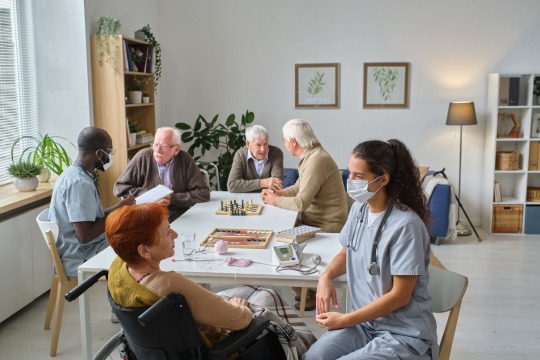
In the evolving landscape of healthcare and community services, the demand for well-trained professionals in the health and social care sector is greater than ever. With growing awareness of mental health, ageing populations, and diverse healthcare needs, the UK has seen a significant rise in opportunities across both public and private sectors. This has led to a surge in individuals enrolling in Health and Social Care Courses UK-wide to build rewarding, impactful careers.
Whether you're a school leaver exploring your options, a care worker seeking formal qualifications, or a career-changer inspired by a desire to help others, health and social care courses offer an accessible pathway into a meaningful profession.
Understanding the Health and Social Care Sector
Health and social care is a broad term encompassing services that support individuals’ physical, emotional, and social well-being. This includes hospitals, residential care homes, community support organisations, and private domiciliary care. Professionals working in this field assist individuals of all ages, from newborns with disabilities to elderly people requiring palliative care.
The UK government continues to invest in this sector due to increasing demand. As a result, the workforce needs qualified professionals equipped with the skills and knowledge to meet regulatory standards and deliver high-quality care.
Why Choose Health and Social Care Courses UK?
Choosing a Health and Social Care Course in the UK can significantly enhance your career prospects, opening doors to various roles, including:
Care Worker
Support Worker
Healthcare Assistant
Social Worker
Youth Worker
Residential Support Worker
Mental Health Practitioner
The UK offers a wide range of accredited courses that are designed to fit different career stages and educational backgrounds. From introductory diplomas to advanced degrees, learners can progress step-by-step toward specialised roles.
Key Benefits of Studying Health and Social Care
1. Career Flexibility
Health and social care roles span a wide variety of settings, including hospitals, schools, community centres, and private homes. Completing one of the many Health and Social Care Courses UK can provide you with the flexibility to work in different environments or specialise in a specific area, such as elderly care or mental health.
2. Skills Development
Courses are designed to develop both practical and theoretical knowledge. Topics often include safeguarding, communication skills, anatomy and physiology, equality and diversity, and care planning. These skills are transferable, valuable, and applicable across numerous sectors.
3. Job Security
The healthcare sector is known for offering excellent job security. As health and social needs grow in the UK, so does the requirement for trained professionals. Qualifying in this field can significantly improve your employment stability and job satisfaction.
4. Personal Fulfilment
Perhaps one of the most significant benefits of working in health and social care is the sense of purpose it provides. Supporting others through their challenges—whether physical, emotional, or mental—can be enriching.
Types of Health and Social Care Courses Available in the UK
There are multiple paths available depending on your experience and career aspirations. Some popular course types include:
Level 2 & 3 Diplomas
Ideal for beginners or those already working in care roles who wish to formalise their training. These qualifications cover essential subjects like personal development, duty of care, and promoting independence.
Foundation Degrees & Higher National Diplomas (HNDs)
These qualifications provide a balance between academic study and practical skills. They're perfect for those aiming to work in supervisory or managerial roles.
Bachelor’s Degrees (BA or BSc)
For those seeking to become social workers or healthcare managers, a full undergraduate degree can provide in-depth training and greater career options.
Postgraduate Courses
Advanced roles in leadership, research, or specialised care (such as mental health or public health) often require postgraduate qualifications.
Short Professional Courses
These may include certificates in dementia care, autism awareness, or safeguarding. They are ideal for continuous professional development (CPD).
Entry Requirements and Learning Options
One of the reasons why Health and Social Care Courses UK are so accessible is the variety of learning options available:
Full-Time and Part-Time: Suited to different lifestyles, whether you’re studying full-time or working while learning.
Online and Distance Learning: Many institutions offer flexible online learning options, enabling you to study at your own pace.
Apprenticeships: Learn on the job while gaining nationally recognised qualifications.
Workplace-Based Training: Some providers allow learning directly in a workplace setting with real-world experience.
Entry requirements vary depending on the course level. While introductory courses may require minimal qualifications, higher-level degrees typically ask for relevant A-levels or equivalent qualifications.
Funding and Financial Support
Studying in the UK often comes with access to financial support through:
Student loans and grants
Employer sponsorships
Apprenticeship funding
Local authority support for those already employed in care roles
This makes training more affordable and accessible for individuals from different economic backgrounds.
The Future of Health and Social Care in the UK
The future is promising for professionals in this field. As the UK faces increasing healthcare needs, particularly due to ageing demographics, the focus on preventive care, community health, and inclusive services will only grow stronger. With innovations in digital health and greater emphasis on mental health, the role of trained health and social care professionals is vital.
By enrolling in Health and Social Care Courses UK, you’re not only investing in your personal development and career progression, but also contributing positively to society.
Final Thoughts
The decision to pursue a qualification in health and social care is more than just a career move—it’s a commitment to making a meaningful difference in people’s lives. With the variety of Health and Social Care Courses UK offers, individuals at any stage of life can take the first step towards a fulfilling and secure career.
Whether you're starting or advancing in your profession, the opportunities in this sector are vast, diverse, and impactful. Now is the perfect time to begin your journey.
#Health and Social Care Courses UK#Construction Training Programs UK#Health Care Certificate Program UK#Awareness of Mental Health Disabilities UK#Dementia and Learning Disabilities UK#Basic Life Support UK#NHS and social care sector in the UK#Communication Course UK#Communication Awareness for Healthcare Professionals UK#Duty of Care Course UK#Healthcare and Adult Social Care Course UK#Equality and Diversity course UK#Fluids and Nutrition Course UK#Handling Information Course UK#Health and Safety Course UK#Infection Prevention and Control UK#Privacy and Dignity Course UK#Safeguarding Adults Course UK#Safeguarding Children Course UK#Understand Your Role Course UK#Work in a Person-Centred Way Course UK#Your Personal Development Course UK#Care Skills and Competencies Program UK#Advance Care Planning Courses UK#Bladder Care and Management Course UK#Bowel Care and Management Course UK#Care after Death Course UK#Care Planning Training Course UK#Diet and Nutrition Course UK#Duty of Care Awareness Course Uk
0 notes
Text
Did you know there are services that offer free university-level modules, for free?
I am one of those people that are obsessed with learning, but structured courses are expensive. Not these. Here are some links if you, too, are obsessed with the pursuit of knowledge and want to learn something (for FREE!)
EdX is my personal favourite. It offers loads of subjects that are usually taken from university courses, and the ones that I have done are pretty good. These can all be taken for free, or you can pay £40 to take the assignments and recieve a graded certificate. Now, the catch here is that most of the courses are archived, which means that, occasionally, some of the links won't work and you have to be creative with the readings. I have found this to be a pretty minimal issue though, and it is worth it.
I recently took this EdX course about 19th Century literature and it was excellent. Some of the links were broken so I took some creative liberties with the readings, but I read all of the books discussed and used the course materials to critically analyse them as I did so. I didn't follow the course exactly, but it was still an enriching experience and something I wouldn't have thought to do otherwise.
Another good one is OpenLearn, which is a branch of the Open University. The OpenLearn courses are usually pretty good, although some can feel a bit lackluster and basic. Don't expect super in-depth courses, but they're good for an introduction to a subject, or to top up your skills in somethign you haven't done in a while. These offer free certificates of participation, so they're great if, say, you want a career change but you haven't studied data science since college. I enjoyed the classes I took, but I wouldn't say they were as challenging as EdX.
I recently took this OpenLearn course about Hadrian's Rome. Classical history is something I'm interested in and this was a great way to guide my study of an aspect of it.
Coursera is a very popular one. Similar to OpenLearn, these courses can sometimes be a little surface-level. These also have a much larger focus on building transferrable skills than developing cultural knowledge and learning for your own enrichment. Even so, there are some wonderful gems on there if you're willing to scroll through and find them. Coursera is also great because it has project-centred courses, where you work towards a finished product under the (virtual, recorded) guidance of an expert. Think of it like a corporate skillshare.
Last summer I took this Coursera course about screenwriting. It was project based, and I came out of it with a fully realised first draft of a pilot episode of a TV show. I realised through this process that maybe screenwriting wasn't for me, but it allowed me to get out of my comfort zone with writing and explore that avenue that I would have probably always wodered about.
OpenCulture is a good database of free courses that then redirects you to other websites, but you have to be willing to sift through the sludge with this one, as some are more worth your time than others.
Another good way to find free courses is to search for them on university websites. I have found that most US universities (and loads of UK ones too, though it is less common) offer free online courses. You have to be careful here, because sometimes they will say they are free but actually the 'free' part is viewing the syllabus.
You might be thinking 'what is the point of a course that doesn't get me a qualification?' and I'd say 'I get you, because I felt the same way,' but if you're anything like me and love learning, they're a godsend. Of course, there is nothing stopping you from finding all of the course content online, and I'd actually encourage you to do that alongside the courses, but knowing where to start is the difficult part. There is so much information to learn about any given topic that it can be overwhelming. These courses provide you with a structure that you can then use within your own wider research to learn about subjects you maybe don't want to commit to in a formal setting.
I'm not paid by any of these websites, I just think the monetisation of knowledge is wrong and awful and disgusting and anyway to beat that should be celebrated and shared and used as widely as possible.
Happy learning! :)
#learning#higher education#career#education#skills#knowledge#wisdom#understanding#writing#write#read#reading#books#humaities#science#history#culture#archaeology#literature#maths#study#studyblr#study motivation#study life#student#student life#studyspo#study blog
5 notes
·
View notes
Text
Practical Guide to Learning Arabic in the UK
Learning a new language can feel challenging, but with a simple, step-by-step approach, it becomes much more manageable. If you’re living in the UK and want to learn Arabic, you’ll find there are plenty of opportunities around you. Arabic is spoken by millions of people worldwide, and being able to communicate in Arabic can be useful for travel, work, or connecting with Arabic-speaking friends and communities. Here’s how you can start your journey to learn Arabic effectively while living in the UK.
1. Understand Why You Want to Learn Arabic
Before jumping into lessons, take a moment to think about your reasons. Are you learning for personal interest, religious studies, travel, work, or to connect with family and friends? Your goal will help guide the type of Arabic you should focus on. For example, Modern Standard Arabic is commonly used for reading and writing, while different dialects are spoken across various regions like Egypt, the Levant, or the Gulf.
2. Choose Between Dialect and Modern Standard Arabic
Arabic comes in many forms. Modern Standard Arabic (MSA) is used in books, news, and formal settings. Dialects, however, vary widely across countries. If you have friends or relatives from a specific country, or you plan to travel to a particular place, learning that dialect might be more helpful. Many beginners start with MSA and then pick up a dialect later.
3. Find Local Arabic Classes or Tutors
In many UK cities, especially places like London, Manchester, Birmingham, and Leicester, you can find language centres or private tutors who teach Arabic. Some universities and community centres also offer Arabic classes open to the public. Learning face-to-face helps with pronunciation and building confidence when you Speak Arabic with others.
4. Join Online Arabic Courses
If your schedule is busy or you prefer learning from home, online courses are a flexible option. There are many platforms offering structured Arabic lessons, ranging from beginner to advanced levels. Some provide interactive exercises, videos, and quizzes to help you practice daily.
5. Practice Speaking with Native Speakers
Speaking regularly is key to becoming comfortable with the language. Look for language exchange groups, cultural events, or local meet-ups where you can practise Arabic. Many UK cities have thriving Arab communities, so you’ll likely find opportunities to engage in conversations. Apps like Tandem or HelloTalk can also connect you with native Arabic speakers online.
6. Immerse Yourself in Arabic Media
Watching Arabic TV shows, listening to music, or following podcasts can help you get used to how the language sounds. Even if you don’t understand every word at first, this exposure improves your listening skills and builds familiarity with common phrases.
7. Use Flashcards and Apps for Vocabulary
Learning new words every day builds your confidence. Apps like Anki, Duolingo, or Memrise can help you remember vocabulary through repetition. Start with everyday phrases and essential words, then gradually move to more complex sentences.
8. Be Patient and Consistent
Learning a language takes time. Some days will feel easier than others, but staying consistent matters more than anything. Set small, achievable goals, like learning ten new words a week or practising conversation for fifteen minutes a day.
9. Visit Cultural Events or Travel
Many cultural centres and embassies in the UK host Arabic language workshops, film screenings, or cultural festivals. These events are a fun way to practise the language and understand more about Arab traditions and customs. If possible, travelling to an Arabic-speaking country can also boost your skills and confidence.
Final Thoughts
Learning to Speak Arabic in the UK is very achievable with the right approach and mindset. Whether you start with local classes, online lessons, or by practising with friends, every small step helps. Focus on your reasons for learning, stay consistent, and most importantly, enjoy the process.
0 notes
Text
Learning the Quran as an Adult in Birmingham
Finding time for religious studies as an adult can feel challenging especially with work family and other responsibilities all pulling at your schedule but more and more people are making space in their week to study the Quran in a way that fits into their lives and it's been a quiet shift happening in different parts of the UK especially in Birmingham where adult quran classes birmingham have become more available and better suited to adult learners
Whether you're starting from scratch or returning to studies you left behind in childhood these classes offer a chance to reconnect with something meaningful some adults join because they want to improve their recitation others are focusing on learning the Arabic script some just want to understand the meanings behind the verses they've heard for years in prayer without knowing what they truly mean and no matter the reason the learning environment tends to be more relaxed than what you might remember from your younger days people sit together ask questions share personal experiences and take things at a steady pace
The best part is how diverse the student groups are you’ll find people of all backgrounds and ages some in their 20s some in their 60s women and men some who speak Arabic at home and others who don’t speak a word of it before joining and that mix of people makes the atmosphere feel welcoming it’s not about being perfect or competitive it's about taking a step forward and doing it together
You can find classes in mosques community centres and sometimes even online with local tutors many places now offer evening and weekend sessions so people who work full-time can still attend and learn at their own pace it’s worth asking about the structure of the course because some focus heavily on tajweed which is the pronunciation and rules of recitation while others lean more towards tafsir which is the explanation and deeper understanding of the Quran
What’s clear from speaking to people who attend is that these classes aren’t just about learning how to read or recite they often become a source of comfort routine and connection some people have made friends there others say it's helped them stay consistent with their prayers or understand khutbahs at Friday prayers better it’s one of those things where the benefit grows slowly over time and you don’t always realise how much of a difference it’s making until you look back
If you’re curious or have been thinking about joining adult quran classes birmingham the best first step is to visit a few places or try out a session see what feels comfortable for you and don’t worry if you feel nervous at first most people do but once you settle in it becomes a part of your week that you start to look forward to quietly and consistently
0 notes
Text
Drivers CPC Online- A Convenient Path to Stay Compliant and Skilled
The Driver Certificate of Professional Competence (CPC) is a crucial qualification for professional bus, coach, and lorry drivers across the UK and Europe. With changing industry demands and digital advancements, many drivers now opt for Drivers CPC online training to meet their legal requirements efficiently and flexibly.
What is Drivers CPC? Drivers CPC is a mandatory qualification for anyone driving a vehicle over 3.5 tonnes professionally. Introduced to improve road safety and maintain high driving standards, it consists of an initial qualification and periodic training. All professional drivers must complete 35 hours of periodic training every five years to keep their CPC valid.
Why Choose Online Drivers CPC Training? Online CPC training has revolutionized the way drivers meet their periodic training needs. Here are the key benefits:
Flexibility: Drivers can attend courses from the comfort of their homes, choosing schedules that fit around work or personal commitments. This is especially useful for self-employed drivers or those with unpredictable shifts.
Time-Saving: Online courses eliminate the need to travel to training centres, saving time and money. This also allows for more sessions to be completed over several days without extended time off work.
Accessible Learning: With a computer or tablet and a stable internet connection, drivers can access quality training from anywhere. This is particularly helpful for those living in remote areas.
Same Certification: Online CPC training is recognized and approved by the relevant authorities. Drivers receive the same certification as they would from in-person courses, and the hours count towards their 35-hour requirement.
What to Expect from an Online CPC Course? Online Drivers CPC courses cover a wide range of topics aimed at enhancing a driver’s knowledge, safety awareness, and legal compliance. Common modules include:
Driver’s hours and tachograph regulations
Vehicle safety and roadworthiness
Fuel efficiency and environmental impact
Customer service and professional image
First aid and emergency procedures
Courses are typically delivered via video conferencing platforms like Zoom or Microsoft Teams. They include live instruction, interactive discussions, quizzes, and question sessions to keep the learning engaging and effective.
How to Get Started with Online CPC Training
Find a JAUPT-approved Provider: Always choose a training company registered with the Joint Approvals Unit for Periodic Training (JAUPT) to ensure your hours are officially recorded.
Book Your Course: Many providers offer full 35-hour packages or individual 7-hour modules. You can book as per your availability and training goals.
Prepare Your Setup: Make sure you have a quiet space, a working webcam, microphone, and a stable internet connection. You’ll need to be visible throughout the course for attendance purposes.
Attend and Learn: Engage actively in the sessions and take notes. Once completed, your training hours will be uploaded to the DVSA system.
Conclusion Drivers CPC online training offers a modern, efficient, and fully approved route to maintain professional driving credentials. Whether you're an HGV driver, a bus operator, or a fleet owner looking to keep your team compliant, online CPC courses provide the perfect blend of convenience and quality.
0 notes